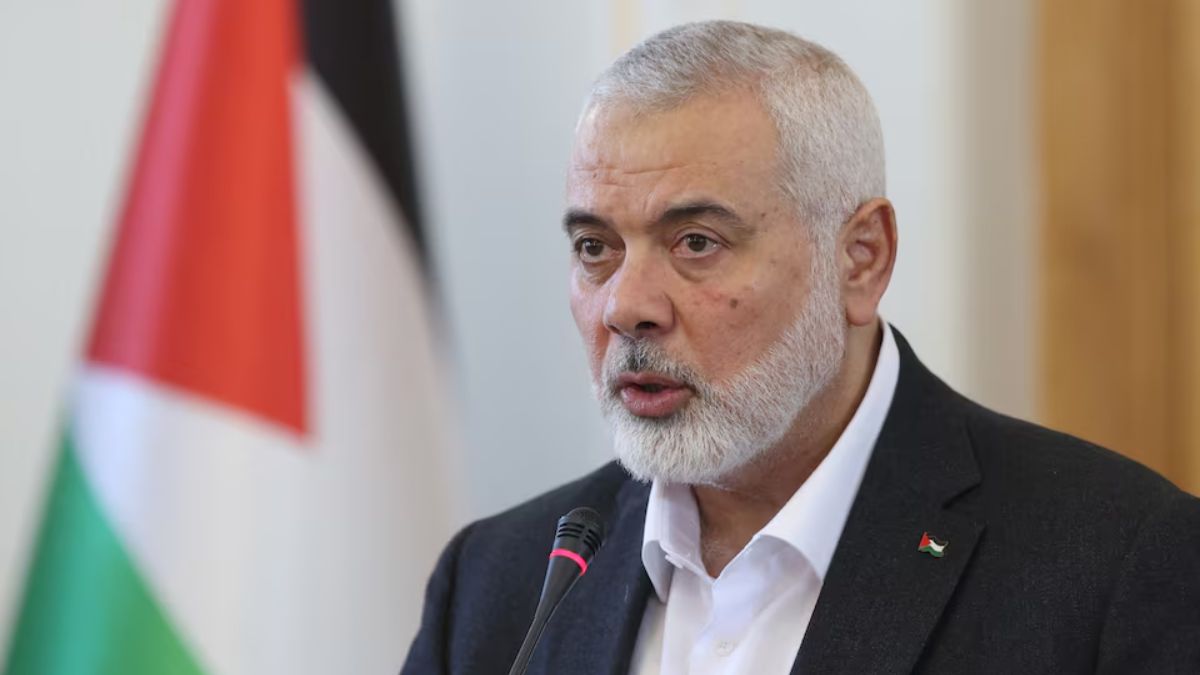Hours after meeting Iran’s newly elected President Masoud Pezeshkian and attending his inauguration, Hamas leader Ismail Haniyeh was assassinated in Iranian capital Tehran. This assassination has been confirmed by Iran and Palestinian armed group Hamas. Haniyeh was running the Hamas rule in Gaza and was once the prime minister of the Palestinian Authority when it governed both the West Bank and Gaza before falling out with PA leader Mahmoud Abbas.
The immediate suspicion after the assassination of Haniyeh goes to Israel, whose intelligence agency has built a reputation of carrying out high-profile elimination of those Tel Aviv describes as “enemy”.
Having been involved in armed violent activities since the 1980s, Haniyeh was allegedly involved in the planning of the October 7 attack in Israel last year when Hamas fighters killed 1,200 people and took some 250 others hostage.
Did Israel assassinate Haniyeh?
Israel vowed to kill Haniyeh and others it found involved in the October 7 attack, which triggered a rather one-sided war in Gaza that has seen more than 35,000 deaths in the Hamas-controlled territory. Israel has refused to stop the war amid repeated international appeals, saying its objective is to destroy Hamas completely.
However, it is not yet clear whether Israel’s Mossad carried out this assassination in Tehran, inside a country that considers it an enemy. Iran has said it is investigating the assassination. But Hamas has already declared that Haniyeh was killed “in a Zionist airstrike on his residence in Tehran”.
Impact Shorts
More ShortsIsrael has not yet responded to the development except some official handles sharing the news of assassination on social media. But then Israel doesn’t necessarily comment on assassinations its intelligence agency Mossad carries out.
Israel foreign affairs ministry shared a post by US Congress member, Democratic Party leader Ritchie Torres, who wrote, “The leader of Hamas has been brought to justice. Permanently. A special place in hell is reserved for him.”
Why Mossad is the prime suspect
Mossad built its reputation of carrying out audacious assassinations in the aftermath of the Munich Olympic terror attack in which a Palestinian outfit, the Black September Organisation, killed 11 Israelis — six coaches and five athletes — who had gone to participate in the 1972 Olympic Games in Germany. One German police officer was also killed. Five attackers were killed by security forces.
Israel vowed to track down the perpetrators including those involved in plotting the attack. It was never officially acknowledged that then prime minister Golda Meir approved the secret Mossad mission but reports have continued to say that tracking down and eliminating enemies have been a part of Mossad’s policy. The Mossad mission was codenamed the Operation Wrath of God.
In January this year, Mossad chief David Barnea, in a blunt warning to the Palestinian militants, said, “Let every Arab mother know that if her son took part in the massacre — he signed his own death warrant.”
Barnea’s warning assumed significance for the occasion and place where he made the statement. It came at the funeral of former Mossad director Zvi Zamir, who had overseen a manhunt — Operation Wrath of God — for Palestinian militants linked to the murder of 11 Israeli coaches and athletes at the 1972 Munich Olympics.
His statement drew an uncanny parallel with Israel’s post-Hamas attack aim to track down those involved in the October 7 attack. Operation Wrath of God has become a symbol of Israel’s willingness to track down its enemies no matter where they are.
Let’s look at some of the most-talked about assassinations attributed to Mossad.
Operation Wrath of God (1972-1988)
Targets: Palestinian terrorists linked to the murder of 11 Israeli coaches and athletes at the 1972 Munich Olympics.
Method: Various methods including letter bombs, shootings, and bombings.
Reason: To avenge the Munich massacre and deter other terrorist groups.
Ali Hassan Salameh (1979)
Target: Chief of operations for Black September Organisation
Method: Car bomb in Beirut, Lebanon.
Reason: Role in the Munich Olympics massacre.
Abu Jihad (1988)
Target: Khalil al-Wazir, deputy to Yasser Arafat and a key leader in the PLO.
Method: Commando raid in Tunis.
Reason: Involvement in multiple attacks against Israeli targets.
Fathi Shaqaqi (1995)
Target: Leader of the Palestinian Islamic Jihad.
Method: Shooting in Malta.
Reason: Responsible for many attacks against Israeli civilians and soldiers.
Yahya Ayyash (1996)
Target: Hamas bombmaker known as “The Engineer”.
Method: Exploding mobile phone.
Reason: Responsible for multiple bombings that killed and injured dozens of Israelis.
Khaled Mashal (1997)
Target: Then-chief of Hamas’s political bureau.
Method: Poisoning in Amman, Jordan.
Reason: Orchestrating attacks against Israel.
Sheikh Ahmed Yassin (2004)
Target: Founder and spiritual leader of Hamas.
Method: Israeli helicopter missile strike.
Reason: Planning and endorsing terrorist attacks against Israel.
Imad Mughniyeh (2008)
Target: Senior military commander of Hezbollah.
Method: Car bomb in Damascus, Syria.
Reason: Responsible for numerous terrorist attacks, including the 1983 Beirut barracks bombing.
Mahmoud al-Mabhouh (2010)
Target: Senior Hamas military commander.
Method: Suffocated in his hotel room in Dubai.
Reason: Involvement in arms smuggling from Iran to Gaza.
Iranian Nuclear Scientists (2010-2020)
Targets: Multiple Iranian nuclear scientists including Mohsen Fakhrizadeh.
Method: Exploding mobile phones, remote-controlled machine guns, and other covert operations.
Reason: To hinder Iran’s nuclear programme.
Saleh al-Arouri (2024)
Target: Senior Hamas leader.
Method: Drone strike in Beirut, Lebanon.
Reason: Retaliation for his role in organising attacks against Israel, particularly the October 7 assault.
These assassinations have been cited to point to Israel’s strategy to neutralise individuals they consider a direct threat to their national security — sometimes preemptively. The methods range from high-tech operations to more traditional espionage tactics, reflecting the complexity and risks involved in such missions. The justifications for these actions are often rooted in self-defence and deterrence against future attacks. Whether this strategy has really worked for Israel is up for debate.


)

)
)
)
)
)
)
)
)



